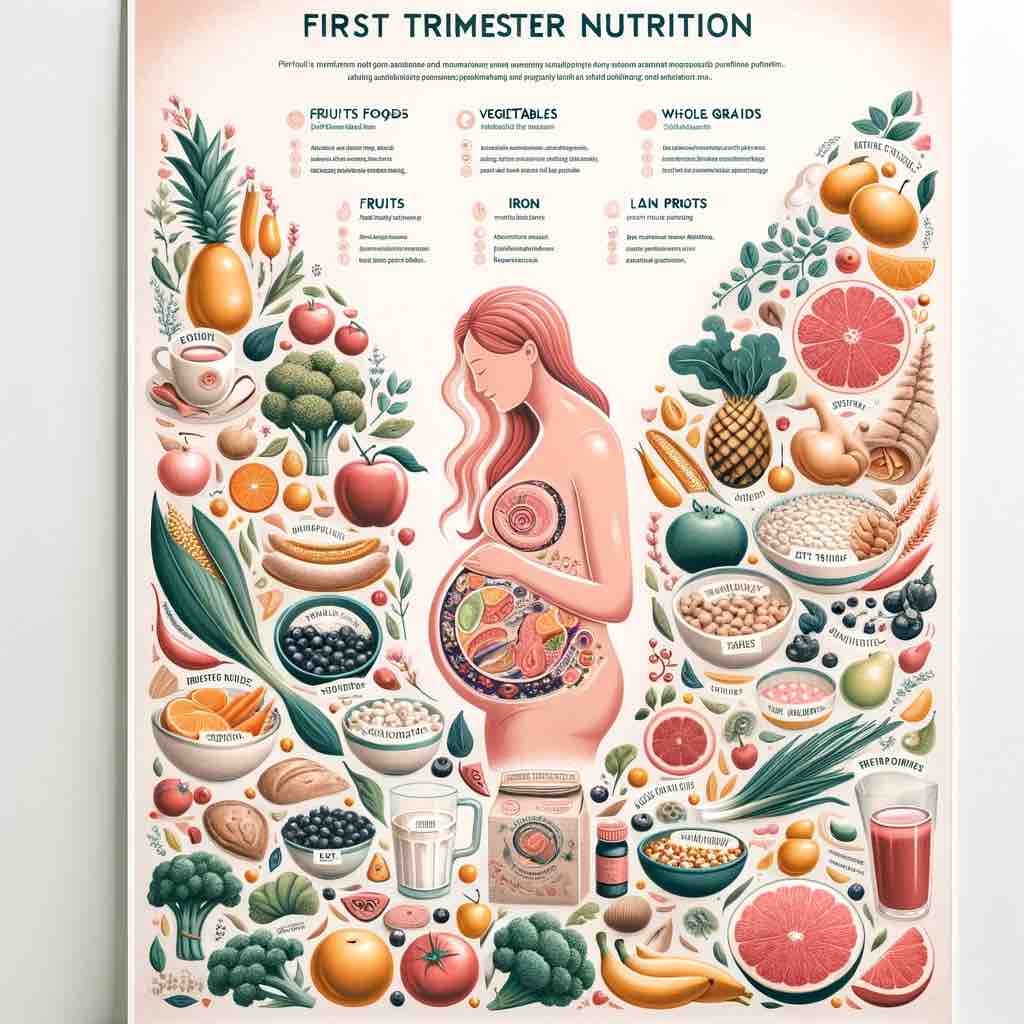
Embarking on the journey of pregnancy, particularly through the critical first trimester, is both exhilarating and challenging. This period lays the foundation for your baby’s development, making nutrition a paramount concern. However, with the abundance of advice and the onset of early pregnancy symptoms, it’s easy to fall prey to certain nutritional missteps. Understanding and circumventing these common dietary errors is essential for the health of both the expectant mother and the developing fetus. Let’s delve into each of these mistakes with a detailed analysis and provide practical solutions for a healthier pregnancy.
1. Folic Acid: The Cornerstone of Pregnancy Nutrition
- In-Depth Understanding: Folic acid is a vital nutrient in pregnancy, essential for the proper development of the baby’s brain and spine. Lack of adequate folic acid can lead to neural tube defects, which occur very early in pregnancy.
- Practical Approach: To ensure sufficient intake, include folate-rich foods like spinach, asparagus, oranges, legumes, and fortified cereals in your daily diet. Additionally, a prenatal vitamin with at least 400 mcg of folic acid is recommended to cover any dietary gaps.
2. The Importance of a Balanced and Varied Diet
- Comprehensive View: A diet that leans too heavily on one type of food or lacks variety can lead to nutritional imbalances, potentially depriving the fetus of essential nutrients.
- Strategic Eating: Strive for a diet that encompasses a range of food groups. Include colorful fruits and vegetables, whole grains, lean proteins, and healthy fats. Experimenting with different cuisines and recipes can add variety and make meals more enjoyable.
3. Managing Cravings with a Healthy Perspective
- Rationalizing Cravings: While it’s normal to experience cravings, excessive indulgence, especially in junk food, can lead to unhealthy weight gain and increase the risk of gestational diabetes.
- Balanced Indulgence: Find healthier alternatives to satisfy your cravings. For instance, if you crave sweets, opt for fruit-based desserts or dark chocolate. Understand and respect your body’s cravings, but maintain a balance with nutritious choices.
4. Maintaining Consistent Nutrient Intake
- Understanding the Risks: Skipping meals or not consuming enough calories can lead to nutritional deficiencies, affecting both the mother’s and baby’s health.
- Conscious Eating Habits: Focus on small, frequent meals if regular meals are challenging. Nutrient-dense snacks like cheese, nuts, or fruit can help maintain consistent nutrient and energy levels.
5. Hydration: The Essence of Pregnancy Wellness
- Recognizing the Significance: Proper hydration is crucial for increasing blood volume and supporting the amniotic fluid. Lack of hydration can lead to serious health issues.
- Hydration Strategies: Drink at least eight glasses of water daily. Include water-rich foods and consider herbal teas or flavored water for variety.
6. Navigating Seafood Consumption
- Analyzing Risks and Benefits: Seafood is an excellent source of essential nutrients like omega-3 fatty acids and protein. However, certain types of seafood can be high in mercury, which is harmful during pregnancy.
- Informed Seafood Choices: Opt for low-mercury fish such as salmon, trout, anchovies, or sardines. Limit seafood consumption to 2-3 servings per week and avoid raw or undercooked seafood.
7. Ensuring Adequate Iron Intake
- Highlighting the Importance: Iron is crucial for supporting increased blood volume and preventing anemia, which can affect the baby’s growth and development.
- Iron-Rich Diet: Incorporate iron-rich foods like red meat, poultry, fish, beans, and fortified cereals. Consuming vitamin C-rich foods alongside can enhance iron absorption.
8. Prioritizing Food Safety
- Addressing the Risks: Pregnant women are more susceptible to foodborne illnesses, which can pose significant risks to the fetus.
- Safe Food Practices: Ensure proper food handling, avoid unpasteurized dairy products and soft cheeses, and thoroughly wash all produce. Cook meats to safe temperatures to avoid any risk of infection.
9. Supplements: Complements, Not Substitutes
- Clarifying Misconceptions: While prenatal vitamins are critical during pregnancy, they are not a substitute for a nutritious diet.
- Supplemental Approach: Use prenatal vitamins to complement a well-rounded diet. Ensure that your diet remains the primary source of vitamins, minerals, and other nutrients. Prenatal vitamins should fill in the nutritional gaps, not replace whole foods.
10. Seeking Professional Dietary Guidance
- Importance of Expert Advice: Personalizing your diet to your specific pregnancy needs is crucial. Self-managing your diet without professional input can lead to unintentional nutritional deficiencies or excesses.
- Engaging with Healthcare Providers: Regularly consult with healthcare providers, nutritionists, or dietitians. They can provide tailored advice, monitor your nutritional status, and adjust dietary recommendations based on your health and pregnancy progression.
11. Understanding Caloric Needs
- Caloric Misconceptions: There’s a common myth that during pregnancy, you need to eat for two. This can lead to excessive calorie intake.
- Caloric Requirements: The caloric needs during the first trimester don’t significantly increase. Focus on nutrient-dense foods rather than increasing quantity. As pregnancy progresses, caloric needs will increase modestly.
12. Incorporating a Variety of Proteins
- Protein Diversity: Relying solely on one type of protein can lead to a lack of essential amino acids and nutrients.
- Varied Protein Sources: Include different protein sources like poultry, fish, dairy, legumes, and nuts. This ensures a comprehensive intake of all essential amino acids and varied nutrients.
13. Managing Portion Sizes
- Overeating Issues: It’s easy to overestimate portion sizes, leading to excessive intake of calories and certain nutrients.
- Portion Control: Use visual cues for portion sizes and be mindful of your body’s hunger and fullness signals. Eating slowly and savoring your food can help in managing portion sizes effectively.
14. Dealing with Food Aversions and Nausea
- Coping with Aversions: Food aversions and nausea can make it difficult to maintain a balanced diet.
- Adapting Your Diet: Find alternative sources of nutrients if you develop aversions to certain foods. Ginger, small frequent meals, and avoiding strong odors can help manage nausea.
Conclusion
The first trimester is a critical period for setting the nutritional foundation for your pregnancy. By being aware of and avoiding these common dietary mistakes, you can ensure that you’re providing the best possible nutrition for your baby’s development and your own health. Embrace this journey with knowledge, mindfulness, and the support of healthcare professionals, and enjoy this special time as you prepare for the arrival of your little one.
10 FAQs for “Nutrition Mistakes Pregnant Women Make in the First Trimester”
- How much folic acid should I take in the first trimester?
- The recommended daily intake of folic acid in the first trimester is at least 400 mcg. Consult with your healthcare provider for personalized advice.
- Can I satisfy my pregnancy cravings without compromising nutrition?
- Yes, you can indulge in cravings occasionally but try to find healthier alternatives and maintain a balanced diet.
- What are some easy ways to include more iron in my diet?
- Incorporate iron-rich foods like red meat, poultry, beans, and fortified cereals. Pair them with vitamin C-rich foods to enhance iron absorption.
- Is it safe to eat seafood during the first trimester?
- Yes, but choose low-mercury fish like salmon and trout, and avoid high-mercury fish like shark and swordfish. Limit your intake to 2-3 servings per week.
- How can I ensure I’m getting enough nutrients if I have morning sickness?
- Try eating small, frequent meals and include nutrient-dense snacks. Ginger and peppermint can help alleviate nausea.
- What should I do if I’m not drinking enough water?
- Aim to drink at least eight glasses of water a day. You can also include hydrating foods like cucumbers and watermelon in your diet.
- Are there any foods I should avoid completely during the first trimester?
- Avoid raw or undercooked meats, unpasteurized dairy products, and high-mercury fish. Also, limit caffeine intake.
- Can I rely solely on prenatal vitamins for my nutrition?
- Prenatal vitamins are important, but they should complement a balanced diet, not replace it.
- Is it normal to gain a lot of weight during the first trimester?
- It’s normal to gain some weight, but excessive weight gain can lead to complications. Focus on a balanced diet and consult your healthcare provider.
- Should I be on a special diet during the first trimester?
- There’s no one-size-fits-all diet for pregnancy, but focus on a balanced intake of fruits, vegetables, proteins, and whole grains. Consult with a healthcare provider for personalized dietary advice.
Blog Tags: Pregnancy Nutrition, First Trimester, Folic Acid, Balanced Diet, Pregnancy Cravings, Meal Planning, Hydration, Safe Seafood, Iron Intake, Food Safety, Prenatal Supplements, Dietitian Consultation, Healthy Pregnancy.













